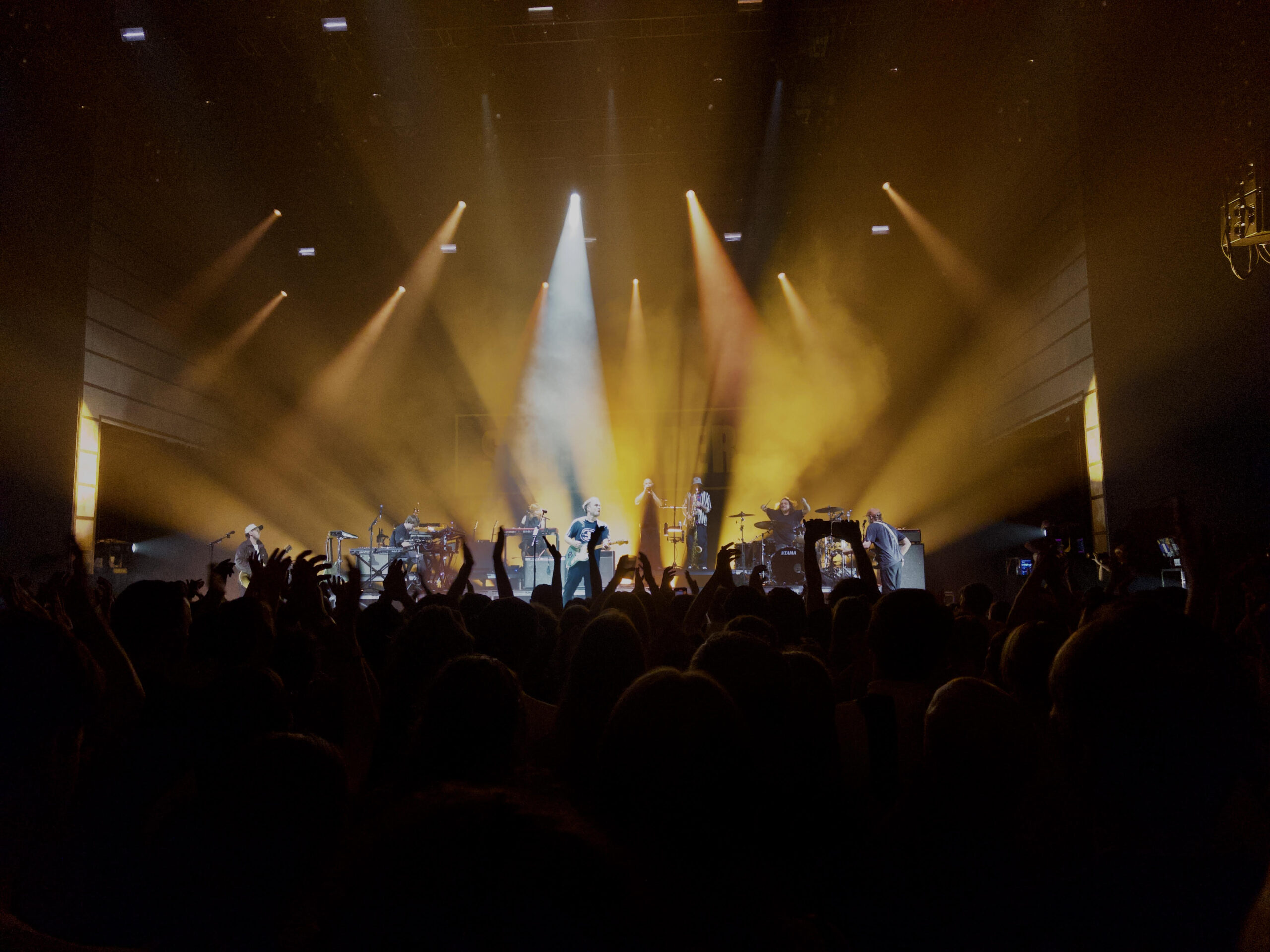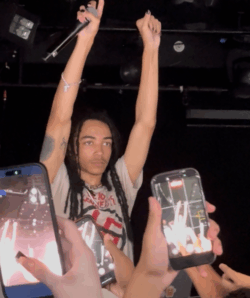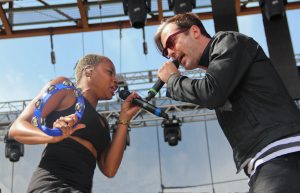The Anthem is not a small venue by any means, but its sweeping stage lights and electronic curtains mix grandeur and warmth—exactly the kind of place where a voice like Sam Fender’s ricochets off the walls and smacks you right in the heart.
It’s September 23, and Fender, North Shields-born singer-songwriter, brings his distinctly Geordie energy to D.C., charming the crowds with his music, sure, but his dry wit as well. I’ve heard people dub him a “Geordie Springsteen,” but the reality of the nickname never truly registered with me until he casually wandered on stage—just another Tuesday night, I guess—settled into a stool to tune his guitar, and jammed out for two and a half hours. The nickname is accurate: his songs really do carry the weight of storytelling as an anthem, firmly grounded in his working-class roots.
Fender is currently touring to promote his recent album People Watching (2025), an evolution from the coming-of-age power of Seventeen Going Under (2021). Still driven by stunning signature saxophone solos, his music has expanded in layers, with richer textures and a broader lens into everyday life. My overall impression of the night? Electrifying. Soul-stirring. I’m not joking. I rarely get carried away by music these days, as surrounded as we are by it: film soundtracks, parties, and the great societal rift of Spotify versus Apple Music (note: If you’re on Apple Music we can’t be friends). Nevertheless, Fender’s live performance reminds you that music is, truly, a journey you actively partake in rather than passively listen to.
The venue was filled to the brim, with fans queuing for a good pint before the lights dimmed for the opening act. “WE ARE YOUNG JESUS!” a man shouted into the mic (and yes, he certainly looked like it) before launching into a jangly guitar riff. The band had a very earnest, indie rock vibe that, with the Anthem’s soaring ceilings, transformed the room from a daunting, dimly-lit auditorium into a cathedral of sound. More people clustered by the stage, creating an organic, simmering energy. They were solid—tight musicians, good energy—and, in student terms, it was like a great pregame that seemed to lead to an even greater night out. When their set ended, we had a thirty-minute wait where I choked on the overwhelming fog of cologne from the group of finance bros behind me, and in a moment I never thought possible, I actually longed for the usual musk of sweat that is a byproduct of being packed into a crowd of feral fans like sardines.
Of course, he played the heavy-hitters (“Seventeen Going Under” and “Hypersonic Missiles”), but one of his first songs to rip through the room was “Will We Talk?,” an energetic tale of heartbreak set around nightclubs and one-night stands. It’s the kind of track soaked in UK youth and drinking culture, a nostalgic call back to my home university in Edinburgh. Musically, Fender and his band were on fire. His vocals were like Springsteen meets North Shields grit: vulnerable and defiant. Guitars rang out like the Anthem was a stadium, and drums were like your own heartbeat echoed back at you. And the endless saxophone solos, too—what more could a girl want? One album reviewer had dubbed Fender’s writing “stream-of-grievances style,” a phrase I’d read before the show and chuckled at. It isn’t wrong, but what that shorthand misses is the way his songs articulate a kind of inescapable reality—the sense of being stuck in a place where upward mobility is impossible, where drug abuse, alcoholism, and quiet despair are cyclical, dominating the darker, realer corners of modern British life. It’s grievance, but grievance refracted through empathy and razor-sharp storytelling, and it was this that brought everyone in the Anthem to near tears by the time Fender sang “The Borders.”
On stage, Fender is a natural. He carries himself with a quiet nonchalance. He knows he’s good, but he’s not here to entertain. Between songs, he cracked jokes, shared anecdotes about his drinking buddies back home, and somehow made the massive venue feel like a living room jam session. The lighting matched the mood perfectly, alternating between deep blues and golden warmth, always in sync with his guitar transitions. Technically, the night was flawless. The sound mix wasn’t too quiet, but neither was it overwhelming. I often have trouble adjusting to the volume of concerts, but this one was flawlessly executed, paired with lighting effects that effectively elevated everything without distracting from the music itself.
The audience gave everything back. People sang, danced, and laughed. There were moments of improvisation, too, which made the evening all the more memorable. As Fender slid into his only slow, mournful piano ballad of the night, a girl in the crowd shrieked, “PLAY ‘SPICE!’” Fender froze, looked up mid-key, and said, “What?” When she and her friends doubled down with an even more frenzied, “PLAY ‘SPICE!’”, he burst out laughing. “I’ve just started playing a really sad song,” he pointed out, “and you’re screaming at me to play ‘Spice.’” The crowd roared with laughter. After his teasing, he sobered up and let it go: “Yeah, ‘course I’ll play ‘Spice.’ Just let me get through this one first,” paired with a few choice expletives. Of course, the performance that followed was so raw that even the finance bros in front of me, previously impervious to sentiment, fell silent. Dare I say I saw one cry into his beer?
Then came the encore. He began strumming, then abruptly stopped, grinning as he told us afterwards was the bit where he’d normally go offstage and we’d all lament, awaiting his return. “I’m not actually leaving,” he assured us, letting us in on the bit. Laughter rippled through the room again. Throughout the night, fans had begun to bark at him (actual barking, I love America), and by the encore, it had grown so loud that he couldn’t ignore it. He strode back onto the stage, seemingly amused as he told us that no one had ever barked at him before.
Was this worth attending? Without a doubt, yes. Fender even let slip that a deluxe album was coming our way by the end of the year and teased us with an unreleased track. Mark your calendars, Fender fans. I would recommend seeing him live without hesitation. I would recommend going to concerts, period. Try standing in a sea of more than 2,500 people all screaming the lyrics to “Seventeen Going Under.” You don’t have to be yourself anymore. You’re small, almost insignificant, but in that smallness you can find distance from your everyday worries, social blunders and academic fiascos alike. You realise: I am in an incredible place, with insane opportunities, witnessing something unforgettable. It’s a true testament to Sam Fender’s raw, irreproducible power—a performance so singular that it lingers long after the final chord has faded.







